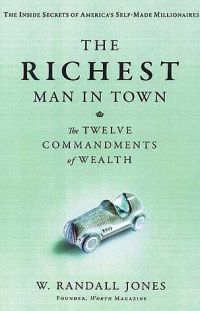Let’s say you plan to set out on a cross-country journey to find the richest self-made man or woman in 100 American towns. A hefty feat? For most, yes, but not W. Randall Jones, author of the new tome, The Richest Man in Town – The Twelve Commandments. Finding the coveted 100 and learning their theories and discerning their commonalities of success has certainly struck a chord. Rich and not-so-rich alike, everyone is able to learn how to add more richness to their lives.
“This may be the most fascinating journey I have experienced in my entire career”, enthuses Randy Jones from his office in midtown Manhattan. “Interviewing the most successful self-made man or woman in towns all across America proved to me that the American dream is very much alive. It also signaled to me that we are living in the most exciting time in American history because of the way media and technology are racing into confluence.” As founder of American Benefactor and Worthmagazines, the always-youthful Jones knows about media and shares that in his new book, The Richest Man in Town – The Twelve Commandments.
At age 29, he was the youngest publisher of a major magazine, Esquire, when he took it over in the 1980s and has looked upward ever since. “My time in the media swirl also taught me that too often the media views wealth and success only through the lenses of Wall Street or Hollywood, and yet there is this vast country in between where great success and massive wealth is being created. You can get wildly rich in any town in America,” says Jones. “In today’s economy, I see a lot of parallels to 1992 when Worth was born. It was a tough economic period then, too. Our country was at war and many folks felt disdain for the wealthy Wall Street players. In tough economic times though, people are looking for answers and solutions, but they still have to be seduced by the medium; there must also be entertainment value. With Worth I wanted to bring a little sex to money; a little Hollywood to Wall Street.”
Jones, in his varied social and professional circles across the globe, has studied the moneyed for years. “In this book, I see the world people first,” says Jones, “because people learn best through the experiences of other people.” Jones also has a radio show in which he counsels people who have been downsized and advises, “It may seem that things are dire, but now is the best opportunity to reinvent yourself and educate yourself in a new way. Be a continual student and a perpetual petri dish for learning.”


